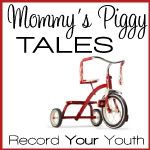Often when I start a personal history for a client, I create a simple timeline of their lives so I can relate their experiences to external events that have helped shape them. In fact, since I started writing personal histories, I've learned more about history & world events in general than I ever learned in school. I guess that personal connection makes all the history seem more real and significant.
Think about some of the elders in your group of friends and family. If they are old enough to have experienced WWI, the Great Depression, WWII and the atomic bomb, you can get some fabulous stories from them.
One of my dearest relatives has Alzheimer's disease, but I recently had an amazing conversation with her. She was "living" in the past almost 50 years ago. As I gently asked her questions about how she met her husband and the wedding dances they used to attend, I saw a side of her I had never seen before. She even giggled(!) when she said, "...then he came right over and asked ME to dance, instead of Rosie." It was a thrill to see her relive that experience.
So make it a point to go see an old friend or relative and ask them questions about what they remember. Don't wait too long, though. Our precious older generation is quickly fading away.
Subscribe to:
Post Comments (Atom)





2 comments:
Very good point, Beth! When I was researching my own family history it always surprised me how often people would repeat garbled 'histories' which I little research would have shown couldn't possibly be true, based on the birth and death dates.
Then again, sometimes the stories are true, just misinterpreted in light of later events. One of my family's stories is a case in point: an ancestor was reported to have been 'crushed to death when walking between two cars' -- in the late 1800's when there were no automobiles to speak of. Of course the 'cars' in question were train cars.
Sarah,
You are exactly right. Stories are basically true, even when a few facts get jumbled. We need to keep in mind that the version of the story we are hearing (or telling) is one person's perception of what happened.
With my six brothers and sisters, we all remember events just a bit differently. Rather than causing conflict, I like to think of it as seeing the world thru multiple lenses.
One person may view the world with rose-colored glasses, while others see the glass as half full or half empty. Regardless of the bare facts, passing time tends to fade our memories. That's when a little research can help to fill in the gaps.
Post a Comment